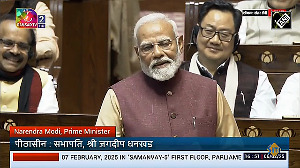Jehovah's Witnesses, a Christian religious group whose prayer meeting in Kochi was marred by devastating bomb blasts a week ago, on Sunday resumed physical prayer meetings after holding online gatherings following the shocking incident that claimed the lives of three persons and injured over 50 others.

The religious group decided to return to physical prayer meetings to remove any fear from its members' minds following the blasts.
The Jehovah's Witnesses traces its origins to 19th century America.
The group in Kalamassery faced a major shock when one of its estranged members -- Dominic Martin -- carried out multiple blasts at one of its conventions last Sunday by using an improvised explosive device.
Prior to surrendering before the police, Martin released a video stating that the group's preachings were "seditious" and that they did not heed his warnings to change their ways, and that is why he carried out the attack.
Three people, including a 12-year-old girl, lost their lives and over 50 were injured in the incident.
Presently, according to a health department release, 20 persons are under treatment with 10 of them in intensive care and two in critical condition.
The remaining eight persons are in the wards, it said.
Subsequently, prayer meetings, usually held twice a week in local 'Kingdom Halls' -- which refers to a local Jehovah's Witnesses meeting place where religious services are held -- were conducted online.
"We decided to return to live (physical) meetings from today to remove the fear from people's minds. The online meetings were held only for a few days following the blasts," T A Sreekumar, a spokesperson of the group's India Branch in Kerala, told PTI.
On being asked whether there were any additional security arrangements in place for these meetings, he said that they already had a security system in place.
"But we have asked everyone to be vigilant and cautious," he added.
Under the existing security system, members are examined before they enter the 'Kingdom Halls' and background checks are carried out of unknown persons, he said.
"An enhanced security may be required in case of larger conventions and if the police say there need to be more security arrangements, we will ensure that," Sreekumar said.
The bomb blasts last Sunday took place on the last day of a three-day prayer convention held at Kalamassery in Kochi, which was attended by over 2,000 members from across the state.
However, the prayer meetings at the 'Kingdom Halls' are much smaller affairs.
"These are small gatherings of 50-60 members and everyone knows each other. No outsider can merely walk in like in churches or temples," Sreekumar said.
The Jehovah's Witnesses community in India boasts 947 congregations and over 56,000 devoted ministers dedicated to sharing their interpretation of the Bible and promoting an understanding of God's kingdom, according to the official jw.org website.
Unlike mainstream Christian denominations, Jehovah's Witnesses do not believe in the Holy Trinity (God, the Father; God, the Son - Jesus; and God the Holy Spirit) but worship Jehovah as the "the God of the Bible and the Creator of all things".
Followers of the group see Jesus Christ as the son of God, and not God himself. They learn from the teachings and examples set by Christ; hence they consider themselves Christians.











 © 2025
© 2025